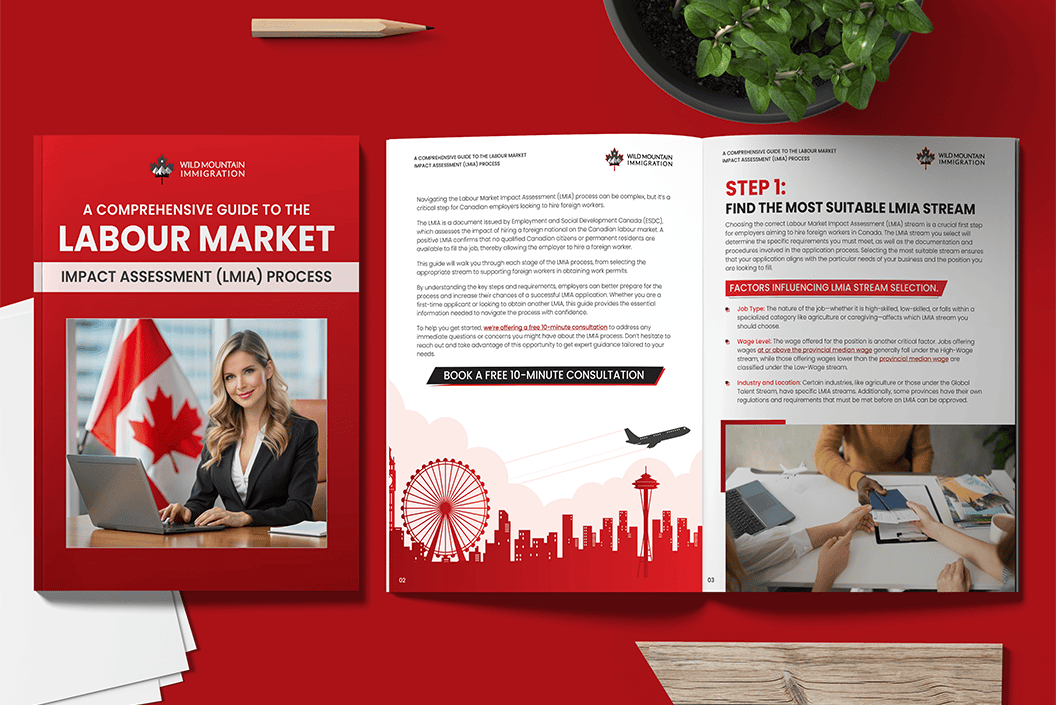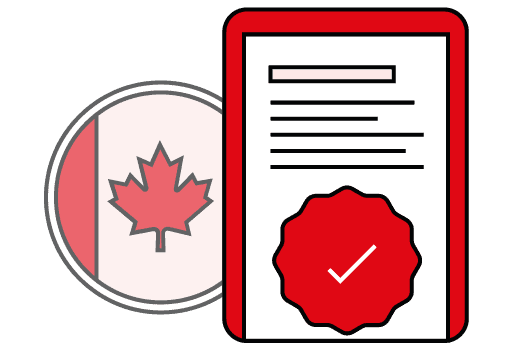An employer in Canada may need to obtain a Labour Market Impact Assessment (LMIA) before employing foreign workers.
A positive LMIA will show that a foreign worker is indeed needed to fill the role and no Canadian citizens or permanent residents are available for the job.
An employer that needs an LMIA must apply for one.
After the employer gets an LMIA, the employee can then apply for a work permit.
Table of contents
Permanent Resident Stream overview
The Federal Government of Canada believes that international workers can help businesses meet their labour demands when Canadians and permanent residents are unable to do so. The government supports foreign workers with skillsets in order to help them establish economically in Canada, as well as assist business employers who are experiencing shortages of skilled labourers.
If you want to hire a skilled foreign worker and support their permanent resident visa application, you can make them a job offer through the Immigration, Refugees and Citizenship Canada (IRCC) Express Entry system. Job offers must adhere to the conditions of one of the economic immigration programs. These programs are:
Programs
In order to apply, the employer must be offering a job that:
- jobs that require high levels of skill, such as management, professional, scientific, technical or trade occupations. National Occupational Classification (NOC), skill type 0, and skill levels A and B
- full-time (a minimum of 30 hours of work per week)
- for at least 1 year, and
- a non-seasonal position
Note: The foreign worker must have at least 12 months of full-time (or an equivalent amount in part-time) skilled work experience in Canada within the 36 months preceding the application for permanent residence under the Canadian Experience Class.
In order to apply, the employer must be offering a job that:
- jobs that require high levels of skill, such as management, professional, scientific, technical or trade occupations. National Occupational Classification (NOC), skill type 0, and skill levels A and B
- full-time (a minimum of 30 hours of work per week)
- for at least 1 year, and
- a non-seasonal position
In order to apply, the employer must be offering a job that:
- an eligible skilled trade or technical occupation (NOC skill level B)
- full-time (a minimum of 30 hours of work per week)
- for at least 1 year
Note: The employment offer can be made by up to two employers under the FSTP.
Employers who want to hire skilled foreign workers through on of the immigration programs above may also want to temporarily hire these workers while their application for permanent residence is being processed. As a result, employers may obtain a dual intent Labour Market Impact Assessment (LMIA) by paying the processing fee. These LMIA’s that have dual intent be used to support the foreign national’s application for a:
- permanent resident visa, and
- temporary work permit
Employers applying for an LMIA to hire high-wage positions can request an employment period of up to 3 years. The duration of the employment must be consistent with the employer’s legitimate business demands. (High-wage positions include the High-wage Stream including caregiver positions, Global Talent Stream, Agricultural Stream and Express Entry). In exceptional cases, the duration may be extended for a period of time that is acceptable to the employer and justifiable given the circumstances.
Low-wage positions will be eligible for 2 years of employment, subject to the legitimate demands of the employer.

Download Your Free LMIA Process Guide
Our guide offers clear, step-by-step instructions to help you avoid common pitfalls and increase your chances of approval.
Program requirements
Processing fee
Employers must pay $1,000 per position to cover the cost of processing a dual intent LMIA application.
Individuals or families wanting to hire a foreign caregiver to provide home care for people requiring assistance are exempt from paying the Labour Market Impact Assessment application processing fee. The processing fee exemption is available to families or individuals with a gross annual income of $150,000 or less who want to hire a foreign caretaker to provide childcare in their home for a youngster under the age of 13.
The processing fee also does not apply to:
Recruitment fees
There are may be a number of expenses and expenditures incurred throughout the process of recruiting temporary foreign workers, including but not limited to:
- the cost of using a third-party representative
- advertising fees
- fees for finding or securing work for a foreign national
- employer-paid fees for help or guidance when hiring foreign nationals
As an employer, you are legally required to confirm that neither you nor anyone else recruiting on your behalf charges or recovers any recruitment fees from the qualified foreign worker. If you do not follow this, your LMIA application will be denied.
Language of work
When employers post job advertisements or apply for an LMIA, they can only request that English and French be spoken. However, if the position requires a different language, you must provide a justification with your application.
There are some exemptions to the language requirement.
Education, training and experience
Employers are responsible for ensuring that foreign workers have the required training, qualifications and experience to do their jobs.
Health insurance
If you live in a province/territory where this is applicable, you must get and pay for private health insurance that covers emergency medical care for any period during which the TFW is not covered by the applicable health insurance system.
The employer-purchased coverage must match the TFW’s first day of work in Canada, and the costs cannot be taken from the employee.
To comply, the employer must provide proof of payment for suitable private health insurance for each TFW and the terms of the policy coverage (for example, what is covered).
Regulated occupations
Employers hiring foreign workers in regulated positions must make arrangements with the appropriate regulatory body for the certification, registration, or licensing of those skilled workers.
A “regulated” profession is one in which a professional or regulatory body has the power to establish entry requirements and standards of practice that lead to certification or registration, as well as licensing (for example, skilled trade positions that must be certified).
It is the employer’s and employee’s responsibility to gather all necessary documents in order to work in Canada. Immigration, Refugees and Citizenship Canada (IRCC) must be confident that the skilled worker can do the task they have been offered before issuing a work permit.
The IRCC will check that the skilled worker has any required certification or licensing to practice their occupation in Canada, which is regulated. If the applicant is not certified or licensed, IRCC will check whether the applicant is likely to qualify for certification when in Canada, before issuing a work permit.
Business legitimacy
All Canadian employers who apply to the Temporary Foreign Worker Program (TFWP) must include documents with their Labour Market Impact Assessment application that prove both the business and job offer are legitimate.
Union consultation
Although it is not necessary, if the job being filled by a foreign worker is organized, employers are advised to:
- attempt to recruit unemployed Canadians and permanent residents, by working closely with union representatives
- the employer should discuss with the union whether or not they are okay with hiring a foreigner for the open position.
- verify that the conditions of the collective agreement (for example, wages, working conditions) will apply to the foreign worker.
Employment agreement
A complete and signed employment agreement does not need to be submitted during the LMIA process, but you must agree to give one to each foreign worker before their first day of work.
An employment agreement must:
- The employment information provided must be for the same occupation, with equivalent wages and working conditions as those specified in the offer of employment;
- The foreign worker's preferred language, whether it is English or French and
- Both the employer and the foreign employee must sign the contract.
Employers must keep thorough employment records to show that they complied with the employment agreement for the entire time of the employee’s work.
Please visit the website of the MIFI (Ministry of Immigration, Francization and Integration) for additional details about employment contracts for positions in Quebec.
Paid third-party representatives
Individuals who represent or assist employers for compensation must be authorized under section 91 of the Immigration and Refugee Protection Act (IRPA), which implies they must be a member in good standing with one of the following:
- a Canadian provincial/territorial law society, or a student-at-law being supervised by it;
- the Chambre des notaires du Québec;
- the Province of Ontario’s law society as a paralegal; or
- the Immigration Consultants of Canada Regulatory Council (ICCRC).
Employers should verify that a specific representative is certified to represent them or give immigration advice at Immigration, Refugees and Citizenship Canada (IRCC).
You can find information about Unpaid third-party representatives.
Recruiters
Depending on the location, there may be different rules that regulate recruiters and recruitment It is your responsibility to ensure you comply with those requirements. You are also responsible for the activities of anyone who works on your behalf as an employer.
New employers
Employers who have not employed a temporary foreign worker in the past 6 years will be subject to a review when submitting a LMIA application. The employer must show that they made a genuine effort to provide a workplace free of abuse and that they weren’t associated with another employer who is ineligible for the TFW Program or in debt of any amount due for an administrative monetary penalty.
Learn what is meant by a workplace that is free of abuse.
Don’t let the complexities of the LMIA process hold you back from hiring foreign workers.
Let's get started
Wages, working conditions and occupations
A temporary foreign worker (TFW) must be paid:
- the foreign worker must be paid the prevailing wage for their occupation and work location, or higher, or
- a wage that is comparable to what they are paying other employees in the same job and work location, if this rate is higher than the prevailing wage
Refer to the median hourly wages published on Job Bank to determine the prevailing wage.
Learn more about the Step-by-step process to determine the prevailing wage of the position.
Unionized positions
Employers who are hiring foreign workers for positions that are part of a union must offer the same advertisement and wage rates as those established under the collective agreement. The collective bargaining agreement will establish the rules of the workplace, including:
- wages
- benefits, and
- hours of work
Employers must provide similar terms and conditions to these non-Canadians as they do to Canadians, and they must also submit a copy of the collective bargaining agreement with their LMIA application to ESDC/Service Canada.
Working conditions
A foreign worker’s exploitation is considered a violation of Canadian law and human rights. Employers must:
- workers must be compensated for all work, including overtime if it is legally required.
- provide safety insurance at your place of business
- offer the same benefits to TFWs as other workers
- not take the TFWs’ identification
The majority of occupations are governed by provincial and territorial legislation that covers labor and employment standards such as: hours worked, working conditions, and termination of employment. Every province and territory has a Ministry of Labour that can provide information to assist employers.
Occupations
Employers can’t force temporary foreign workers to do work for which they were not hired or trained. For example, an employer who wants to hire a foreign worker as a carpenter cannot instead give them the duties of a janitor.
Recruitment and advertisement
Employers must engage in recruiting efforts to find Canadians and permanent residents before employing foreign workers.
Employers who pay a temporary foreign worker (TFW) a wage that is:
- below the provincial/territorial median hourly wage must meet the Advertisement and Recruitment requirements of the Stream for Low-wage positions;
- at or above the provincial/territorial median hourly wage must meet the Advertisement and Recruitment requirements of the Stream for High-wage positions.
Don’t let the complexities of the LMIA process hold you back from hiring foreign workers.
Let's get started
Apply for a Labour Market Impact Assessment
Employers who wish to hire foreign workers must submit an LMIA application and all necessary supporting documents to Employment and Social Development Canada (ESDC)/Service Canada.
In short, by hiring a foreign worker, Canadian employers are asking for an opinion on how it would affect Canada’s job market. Therefore, is it critical that businesses follow every step and submit all needed documents.
Apply via LMIA Online portal
You need a Job Bank user account to log in and access LMIA Online. If you’re an employer, you may also need a third-party account for authentication purposes.
Complete your one-time registration in Job Bank for Employers by clicking on the link below and following the instructions.“Don’t have an account? Sign up now.” button.
It will take around 10 minutes to complete the registration procedure.
After you create your Job Bank account(s), you can complete an LMIA application on the LMIA Online Portal.
Steps after receiving a Positive LMIA
After the LMIA application is approved, the employer will receive an approval letter. This positive LMIA will be valid for 18 months from the date of issue.
The letter will not include the names of the temporary foreign workers for privacy reasons. The names of the workers will appear in Annex B, which is only for employer records and not required to be shared with potential employees when applying for a work permit.
The positive LMIA letter supports both the skilled worker’s application to IRCC for a:
The employer’s responsibilities after they’ve received a positive LMIA include:
- sending a copy of this letter and Annex A to the foreign worker
- ask the foreign national to apply for a permanent residency visa to immigrate to Canada, or/and for a work permit. The foreign worker must attach the following documents to the application: a signed job
- offer from both the employer and employee, as well as an LMIA letter and Annex A.
Nicola Wightman
Nicola Wightman is a regulated Canadian Immigration Consultant (RCIC) under the College of Immigration and Citizenship Consultants (CICC). Her professional immigration consultant number is R706497.
Immigration options
Start Your Canadian Immigration Journey
Our experts make the process clear, stress-free, and successful, so you can move forward with confidence and focus on what matters most.

Get Started Today
"*" indicates required fields


